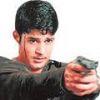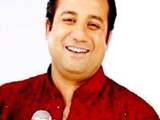A REUNION WITH THE ALI KHAN CLAN, FIVE YEARS ON
RAHAT NUSRAT FATEH ALI KHAN
SHORELINE AUDITORIUM "Which song are they on?" I asked the young man whom Riz was greeting with a hug outside Shoreline Auditorium, as my ears focussed in on the sound of Qawwali voices coming through the open entry door. Riz, my Pakistani-American friend and concert-organizing partner of many years past, had left me at the office of
New Wave Travel until past 8:30 that evening, as he went with his family first to an engagement party, then to a wedding, from which he had returned to pick me up for
Rahat Ali Khan's first Seattle performance as leader of his own Qawwali party. I had heard a lot about my old "window-climbing buddy", as I used to call him, since the time in August 1996, after
Nusrat Fateh Ali Khan's last performance here, when Rahat and I had tried to exit the Paramount Theatre through a fourth-story window, and had gotten trapped on a locked fire escape on the east side of the building. But for the first time, I was coming to hear Rahat as lead qawwal, rather than as supporting solo singer to Nusrat. And here I was late. Riz had assured me that it would not start at the scheduled time of 7:30 PM that night (Pakistani events, like Irish ones, rarely if ever start on schedule); but he had over-estimated how much later the concert would start. Rahat and Party were well into a high-spirited qawwali, having started without us. "They're on the second qawwali now", the man told me, and I grabbed the comp ticket out of my purse and ran for the door, as Riz paused to greet all the guys waiting outside in the rain for their own tickets in Riz's manila envelope. Sure enough, after I had turned in my ticket and scrambled into the auditorium, I heard Rahat reach the verse referring to the 13th century founder of the Qawwali genre, Hazrat Amir Khusro. The song was a
qaul, a sort of ancient Sufi devotional hymn, or, one might say, a "proto-qawwali." It was not long after I came in that I noticed the familiar energy, or "vibe", that I had felt before at Qawwali concerts by Nusrat, and more recently by the Rizwan-Muazzam Qawwali group. It was a kind of warmth, with a subtly moist feeling about it. And then, I felt something in the energy rush forward and throw or wrap itself around me in an embrace of still-vibrant life-essence; I had not been expecting this, though I had hoped to feel Nusrat in there somewhere. He was there all right, and I smiled and greeted him silently before sitting down. The group was just finishing the second song, and launching into the
manqabat devotional song, "Ali Da Malang". I knew many of the songs that Rahat featured that evening, as I had heard Nusrat sing them with the old group many times before, both live and on recordings. I had missed the familiar opening
Hamd Qawwali, "Allah Hoo", a personal favorite of Nusrat's; but there was also "Ali Da Malang", "Dam Mast Qalander", "Akhian Udik Diyan", "Tum Ek Gorakh Dhandha" and "Sajna Tere Bina", among others. I was especially moved when Rahat launched into "Ankh Utthi Mohabbat ne Angrai Lee". I still remembered photocopying that title off my cassette with that song back in 1995, the year Riz and I organized Nusrat's show at the Moore Theatre. I couldn't read a word of this title on the tape cover (it was all in Urdu script), but I figured Nusrat or somebody would be able to, and I wanted to present this to him as a special request. I gave it to Rahat during the break, and I recalled how his eyes lit up and he called out the title excitedly as he read it. They didn't get around to that selection on that occasion, unfortunately; but now, it was as if Rahat saw me in the theater and remembered that request from way back, pulling it out again and performing it beautifully. The only problem with the first half of the set was that all the mikes were up way too loud, especially those on Dildar Hussain's tabla set. When I went back and mentioned this to the sound team, they merely remarked, "That's how they want it." The volume wasn't too bad along the side sections, but it was almost unbearably intense in the middle. So, during the break, I followed a bunch of guys backstage (sabotaging the attempts by the designated security guys to keep us all out) to see if I could talk to Rahat and convince him to take charge of the sound problem himself in instructions to the sound guys. However, I nearly forgot about this mission when Rahat, as soon as he saw me, bounded forward with a delighted grin and grabbed my hand in both of his, in traditional Pakistani fashion. "I haven't seen you in five years!" I yelled, and he yelled back in agreement, among other greetings. It was as if we had last spoken mere weeks before, and yet it was an incredibly heart-warming reunion. He had hardly changed a bit in the interim, aside from a bit of hair-thinning over his forehead. He was the same friendly, down-to-earth young guy with whom I had had a number of easy, humorous chats during dinner parties in 1995 and 1996; and, contrary to rumor, he had not grown anywhere close to Nusrat's size. His build was about as average as always for a young man standing a mere inch or two above five feet. I mentioned that I had seen the photograph on his website of him standing with his father and former President Bill Clinton, in which the latter had towered considerably over Rahat's head, and Rahat bent over with embarrassed chuckles. Presently Riz came up, thinking to introduce me, and saying that I had waited nearly two hours back in his office prior to the show. "And he ABANDONED me!" I told Rahat, and the three of us convulsed with giggles once again. Rahat explained, at one point, that his planned concert tour in March had had to be cancelled, as his mother (not his father, as I'd heard) had become quite ill; but everyone in the family was fine now. It was then that I mentioned that the sound was a bit too loud in the middle segment of the room, and Rahat nodded in assent, determined to fix the situation in the second half if at all possible. Finally, I went to reintroduce myself to Rahat's father, Farrukh Fateh Ali Khan, whom I had also not seen since they were last here with Nusrat in 1996. Farrukh, for some reason, was rather subdued, talked little, and looked a bit under the weather, though he smiled and bowed slightly in his chair when I greeted him. I didn't know if he was ill or just tired, and didn't bother asking. He seemed to walk with a slight limp and needed a bit of assistance in walking out of the building after the show, and didn't take nearly as many vocal solos as he had in the past. Fortunately, however, his voice and harmonium playing were still in fine form throughout the evening. His was always the most elastic voice among the solo singers in the old party; and he could usually sing both higher and lower than Nusrat's typical range. The audience, sparse though it was, was clearly enjoying the show and the chance to reconnect with Rahat, Farrukh and Dildar during and after the concert. Numerous people came up to offer money and requests written on pieces of paper during the performance, as is customary during Qawwali and Ghazal concerts. However, the audience, though mostly comprised of local Pakistani families, were a bit shy about dancing during most of the concert, even when they appeared to want to do so. This surprised me, but I waited until the closing song, "Dam Mast Qalander", to jump up and begin dancing in the right aisle alongside Riz. This catalyzed further wild dancing by several more listeners, though not as many as I would have liked. Before then, I had wanted to dance, but contented myself for a while with swaying and pitching in my seat rather than dance alone. But when the chant of "Dam mast qalander mast mast" began, there was no way I could stay put for long. After the show, Riz, Rahat, his party and numerous friends and fans retired to Caf ZumZum in downtown Seattle for a late night impromptu dinner party. Outside the Caf, we were treated at one point to the sight of Rahat running up to Riz, picking him up and swirling him around in the air a couple of times (even though Riz is at least a head taller of the two). While at this talkative, happy gathering, Rahat and I spoke quite frankly about how I had been dealing with the loss of Nusrat. Rahat, in fact, was the one who brought it up, as Riz had mentioned this to him at some point earlier, in person or by phone. I told Rahat that, indeed, I had had a very rough time dealing with this tragedy--at times wanting to die myself--and that I was still in the process of recovery of my emotional and creative faculties. While Rahat was fairly religiously stoic about his own experience of loss and grieving at this point, he has described it in recent interviews in terms of losing the best friend he ever had, someone with whom he had a father-son relationship, in addition to their uncle-nephew and teacher-student relationships.
Clearly, Nusrat has left his music in very fine hands. Rahat has had at least twenty years of training and relentless practice, and this background serves him well. He has mastered the art form of classical vocal improvisations, sargam and taan runs and raags (scales), and yet his embellishments during songs are all his own, not merely imitations of Nusrat's practice. He can pull improvised passages out of thin air with a fury, blazing through multiple octaves, and taking on mind-blowing melodic and rhythmic phrases I have never heard from Nusrat or any other Qawwali singer. With time, age and experience, he should have no trouble leading us into mystical states not unlike those we traveled in with Nusrat in the lead. However, I still miss and long for Nusrat's voice and spirit. Nusrat was a very powerful musical shaman who could transport hundreds or even thousands of people at once into blissful planes close to non-ordinary reality, and with a strong awareness of Divine Love and Presence everywhere. By the time he last performed here in 1996, I had had enough experience with his music as a mystical vehicle (both live and recorded) that I knew I could trust him to keep this journey a positive and joyful one, and to bring us all back safely to ordinary reality again. So when I felt the familiar pull from the music calling me to dance within its energy, I had no trouble or fear of slipping into the power of the song and Nusrat's voice, and bidding him to take me where he would. This is the experience that I still long for and desire to return to me. No other musician has touched me in a remotely similar way before or since, with the possible exception of the late Jacqueline du Pr, whom I sometimes call the "Nusrat of the cello." I know that they are both still here with us on a different plane, but (to paraphrase the Scottish poet Lady Nairn) how I "grudge them sair tae the Land O' the Leal"! And perhaps they both know that I still argue and bargain for their return--together, in the best of all possible worlds.
Edited by Qwest - 18 years ago













comment:
p_commentcount